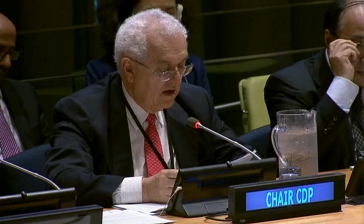CDP Theme: Social Issues
Social Issues
17 July 2017
On 17 July 2017 Professor Jose Antonio Ocampo, Chair of the Committee for Development Policy (CDP), introduced the Committee’s findings on “Lessons learned in developing productive capacities from countries graduating and graduated from the LDC categor ...
28 June 2017
OHRLLS is convening a consultative meting of LDCs and Friends of LDCs on the implementation of the SDGs and Istanbul Programme of Action for the LDCs. Increasingly urgent and complex challenges that are driving the development needs and vulnerabilities ...
10 May 2017
CDP Background Paper No. 36 By Daniel Gay The United Nations Committee for Development Policy (CDP) comprises 24 independent specialists from a variety of disciplines. It advises the UN Economic and Social Council on emerging economic, social and envir ...
12 April 2017
The paper starts with an overview of Ethiopia’s economic growth and the change in the domestic economic structure. The manufacturing sector is seen as the success of Ethiopia’s Growth, and its development to a large extent the product of an activist developmental state. The paper then examines growth and diversification of exports and the country’s recent efforts to effectively exploit its natural resources. An analysis of public and private investment and the underlying allocation of financial resources finds that a recent upturn in domestic investment has been financed largely by foreign aid, and that private financing remains too low. Finally, the paper addresses educational attainment, arguing that Ethiopia has some distance to go in its attempts to close the large human capital gap relative to other low-income countries.
8 November 2016
The ePing system, an SPS and TBT notification alert system developed by UN DESA in cooperation with the WTO and ITC, is officially launched on 8 November 2016 at the WTO, by UN Assistant Secretary-General for Economic Development in UN DESA Lenni Montiel, WTO Deputy Director General Karl Brauner and the Executive Director of ITC Arancha González.
29 September 2016
On 29 September 2016 the CDP Subgroup on Leaving No One Behind will hold a virtual meeting to discuss development strategies that particularly promote the well-being of the worst off, as a part of the Committee’s multi-year work programme on the theme ...
11 July 2016
CDP Background Paper No. 33 By Giovanni Andrea Cornia and Antonio Scognamillo The conventional approach to least developed country (LDC) graduation has considered these countries as an undifferentiated group whose problems could be solved by means of s ...
24 June 2015
The increasing problems associated with international migration call for nations to manage migratory flows in a more realistic way both at national and international levels. However, global initiatives undertaken to date in this field have seen very limited success. This paper adopts a political economy approach for identifying the interests of affected social groups with a view towards building feasible policy responses. A dual proposal for global governance of migration is suggested, based on a combination between the establishment of universal minimum standards and the promotion of bilateral and regional interaction driven by problem-solving goals.
15 July 2014
CDP Background Paper No. 18 By Mustafizur Rahman Global evidence suggests that trade-related performance is becoming increasingly important for the socio-economic development of many developing countries. The paper finds that trade preferences accorded ...










Follow Us